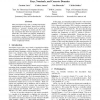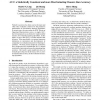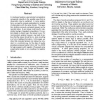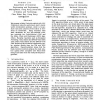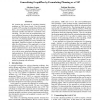120
click to vote
IJCAI
2003
15 years 2 months ago
2003
Query answering over commonsense knowledge bases typically employs a first-order logic theorem prover. While first-order inference is intractable in general, provers can often b...
IJCAI
2003
15 years 2 months ago
2003
In previous work, Levesque proposed an extension to classical databases that would allow for a certain form of incomplete first-order knowledge. Since this extension was suffici...
IJCAI
2003
15 years 2 months ago
2003
Many description logics (DLs) combine knowledge tation on an abstract, logical level with an interface to “concrete” domains such as numbers and strings. We propose to extend ...
IJCAI
2003
15 years 2 months ago
2003
Predictive accuracy has been used as the main and often only evaluation criterion for the predictive performance of classification learning algorithms. In recent years, the area ...
IJCAI
2003
15 years 2 months ago
2003
There have been many proposals to compute similarities between words based on their distributions in contexts. However, these approaches do not distinguish between synonyms and an...
102
Voted
IJCAI
2003
15 years 2 months ago
2003
In rule-based systems, goal-oriented computations correspond naturally to the possible ways that an observation may be explained. In some applications, we need to compute explanat...
IJCAI
2003
15 years 2 months ago
2003
107
click to vote
IJCAI
2003
15 years 2 months ago
2003
This paper presents an action selection framework based on an assemblage of self-organizing neural networks called Cooperative Extended Kohonen Maps. This framework encapsulates t...
IJCAI
2003
15 years 2 months ago
2003
Abstract. This paper presents a unifying framework to model casebased reasoning recommender systems (CBR-RSs). CBR-RSs have complex architectures and specialize the CBR problem sol...
105
click to vote
IJCAI
2003
15 years 2 months ago
2003
We examine the approach of encoding planning problems as CSPs more closely. First we present a simple CSP encoding for planning problems and then a set of transformations that can...

